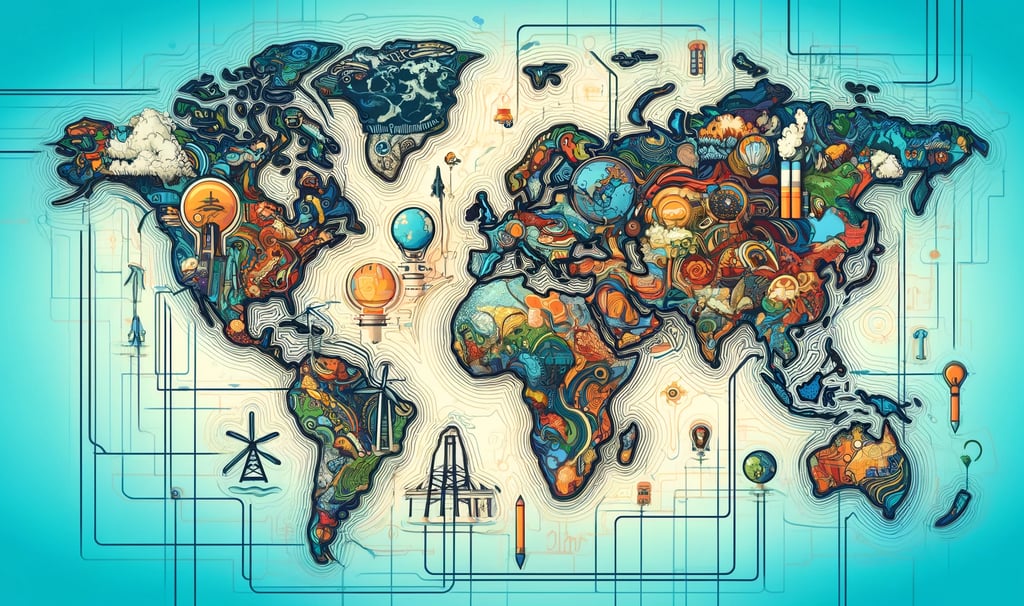“The New Map” by Daniel Yergin
Explore Daniel Yergin's insights on energy, climate, and global power shifts in "The New Map." Essential for procurement, supply chain, and marketing strategies.
BOOKS
The Procure 4 Marketing Team
6/13/20244 min read


Daniel Yergin's "The New Map: Energy, Climate, and the Clash of Nations" is a masterful analysis of the changing geopolitical landscape shaped by energy, climate policies, and technological innovations. For professionals in procurement, supply chain, and marketing, Yergin's insights provide a crucial understanding of the global dynamics that influence strategic decisions. This review explores key themes, critical analysis, and the implications of Yergin's work for these fields.
Overview
"The New Map" is a sweeping narrative that examines the shifts in global power dynamics through the lens of energy resources and climate change. Yergin, a Pulitzer Prize-winning author and energy expert, delves into the interplay between geopolitics, energy markets, and environmental policies, offering a comprehensive view of the factors that will shape the future. The book covers significant developments in the United States, Russia, China, the Middle East, and beyond, providing a detailed analysis of how these changes impact global stability and economic strategies.
Key Themes
1. The Shale Revolution: Yergin highlights the transformative impact of the shale revolution in the United States, which has turned the country into a leading oil and gas producer. This shift has major implications for global energy markets, trade patterns, and geopolitical alliances. Procurement and supply chain professionals must understand these dynamics to anticipate changes in energy supply chains and cost structures.
2. Geopolitical Shifts: The book examines the strategic maneuvers of major powers like Russia and China. Russia's efforts to leverage its energy resources for geopolitical influence and China's Belt and Road Initiative are critical factors that shape global supply chains. Professionals need to be aware of these developments to navigate risks and opportunities in international markets.
3. Climate Change and Energy Transition: Yergin explores the growing emphasis on renewable energy and the global push for decarbonization. This transition presents both challenges and opportunities for procurement and supply chain managers. Understanding the implications of climate policies and the shift towards sustainable energy sources is essential for developing resilient and future-proof strategies.
4. Technological Innovations: The book discusses the role of technology in reshaping energy production and consumption. Innovations in renewable energy, electric vehicles, and digitalization are key trends that will influence procurement strategies and supply chain logistics. Keeping abreast of these technological advancements is crucial for maintaining a competitive edge.
5. The Middle East and Energy Security: Yergin provides an in-depth analysis of the Middle East's role in global energy security. The region's political instability and its pivotal role in oil production are significant factors that affect global energy markets. Professionals in procurement and supply chain management must consider these risks when planning for energy security and diversification.
Critical Analysis
Yergin's "The New Map" is a meticulously researched and compelling narrative that offers valuable insights into the evolving energy landscape. However, it is important to consider some critiques and limitations of the book.
1. Complexity of Energy Transition: While Yergin highlights the shift towards renewable energy, the book sometimes underestimates the complexity and scale of this transition. The move away from fossil fuels involves significant technological, economic, and political challenges that require more nuanced analysis. Supply chain professionals must prepare for a gradual and multifaceted transition rather than a swift shift.
2. Focus on Major Powers: The book's focus on major geopolitical players like the U.S., Russia, and China means that the perspectives of smaller nations and emerging economies are less emphasized. For procurement and supply chain professionals operating in diverse markets, it is important to consider a broader range of geopolitical influences.
3. Short-Term vs. Long-Term Perspectives: Yergin's analysis often centers on current trends and immediate geopolitical strategies. While this is valuable, a deeper exploration of long-term scenarios and potential disruptions would provide a more comprehensive strategic outlook for professionals in procurement and supply chain management.
Implications for Procurement, Supply Chain, and Marketing Professionals
1. Procurement: Yergin’s insights into the shale revolution and energy market dynamics are critical for procurement professionals. Understanding the volatility of energy prices and the geopolitical factors influencing supply can help in negotiating better contracts and securing stable energy supplies. Additionally, the shift towards renewable energy sources presents opportunities for sourcing sustainable materials and technologies.
2. Supply Chain: The geopolitical shifts outlined in "The New Map" have profound implications for global supply chains. Professionals must be adept at managing risks associated with geopolitical instability and diversifying supply sources. The emphasis on technological innovations and climate policies also requires supply chain managers to invest in sustainable practices and resilient logistics networks.
3. Marketing: For marketing professionals, Yergin’s analysis of the global energy landscape provides insights into consumer trends and regulatory environments. The growing emphasis on sustainability and renewable energy can be leveraged to build brand value and engage with environmentally conscious consumers. Understanding the geopolitical context also aids in developing targeted marketing strategies for different regions.
Conclusion
"The New Map: Energy, Climate, and the Clash of Nations" by Daniel Yergin is an essential read for procurement, supply chain, and marketing professionals. The book’s detailed analysis of energy markets, geopolitical strategies, and technological innovations offers valuable insights that are crucial for strategic decision-making in these fields.
While the book provides a comprehensive overview of current trends and challenges, professionals must also consider the complexity and long-term implications of the energy transition. By integrating Yergin’s insights with a broader understanding of global dynamics, procurement, supply chain, and marketing professionals can navigate the evolving landscape and drive sustainable and resilient business strategies.
In conclusion, "The New Map" equips professionals with the knowledge to anticipate and respond to the profound changes shaping the global energy and geopolitical environment. By staying informed and adaptable, procurement, supply chain, and marketing leaders can ensure their organizations remain competitive and forward-thinking in a rapidly changing world.

